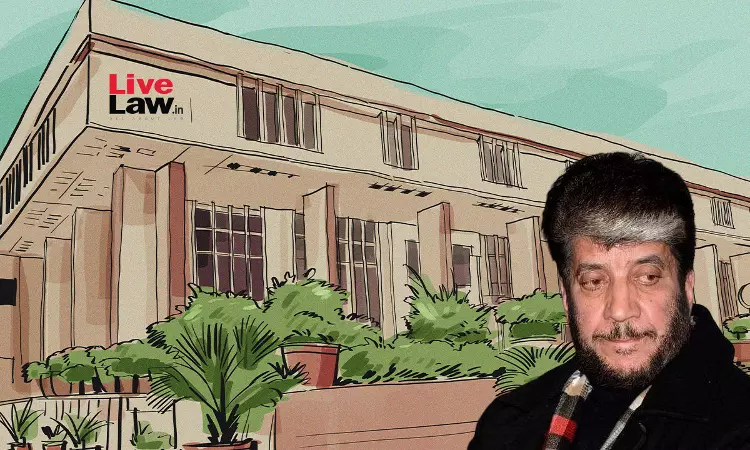- Home
- /
- High Courts
- /
- Delhi High Court
- /
- Right Of Free Speech Not To Deliver...
Right Of Free Speech Not To Deliver Inflammatory Speeches: Delhi High Court In Shabir Ahmed Shah's Bail Plea In Alleged Terror Funding Case
Jayanti Pahwa
12 Jun 2025 4:11 PM IST
The Delhi High Court, on Thursday (June 12), refused to grant bail to Kashmiri Separatist Leader Shabir Ahmed Shah challenging an NIA court's order denying him bail in an alleged case of terror funding. A division bench of Justice Navin Chawla and Justice Shalinder Kaur upheld the decision of the NIA court, observing that the right to freedom of speech and expression could not be invoked...
The Delhi High Court, on Thursday (June 12), refused to grant bail to Kashmiri Separatist Leader Shabir Ahmed Shah challenging an NIA court's order denying him bail in an alleged case of terror funding.
A division bench of Justice Navin Chawla and Justice Shalinder Kaur upheld the decision of the NIA court, observing that the right to freedom of speech and expression could not be invoked to justify inflammatory speeches or incitement of unlawful activities.
The bench stated, “This right (right to freedom of speech and expression) cannot be misused under the garb of carrying out rallies wherein, a person uses inflammatory speeches or instigates the public to commit unlawful activities, detrimental to the interest and integrity of the country”.
The case stems from an FIR registered by the NIA alleging a wide-reaching conspiracy involving secessionist activities, terrorist funding, and public unrest, allegedly coordinated by various separatist leaders, including Shah. Per the prosecution, Shah was a key figure in this network and received funds through illegal channels such as hawala, LoC trade, and overseas sources. The funds were used to incite protests, stone pelting, and militant activities. Shah was also linked with known militant leaders Hafiz Saeed and Syed Salahuddin, and hawala operator Zahoor Watali.
Shah, represented by Senior Advocate Colin Gonsalves, argued that the prosecution relied on evidence that was outdated, uncertified, and already subject to prior legal proceedings without any convictions. It was contended that no direct acts of terrorism could be attributed to Shah and that the charges were an unjustified criminalization of political speech.
However, the court rejected these arguments, stating that freedom of expression is constitutionally protected, it cannot be extended to activities that incite violence or endanger national security.
Senior Advocate Sidharth Luthra, representing NIA, informed the court regarding Shah's involvement in a deep-rooted conspiracy related to secessionist and terrorist activities in Jammu and Kashmir. As chairman of JKDFP, an unlawful association, Shah was accused of organizing violent protests, inciting stone pelting, and receiving funds from Pakistan routed through LoC trade and student admissions.
On the question of admissibility and credibility of evidence, the court clarified that such determinations must be made during the trial proceedings and not at the stage of bail.
Another contention raised by Shah pertains to the rallies. It was argued that the speeches were not inflammatory but an exercise of the right to freedom of speech and expression, as well as the right to self-determination.
However, the court rejected this argument. The court acknowledged that the Constitution guarantees the right to freedom of speech and expression but also emphasized that such a right was subjected to reasonable restrictions. The court, therefore, held that the right could not be misused under the pretext of holding rallies where a person delivers inflammatory speeches or incites the public to engage in unlawful activities that pose a threat to the nation's integrity and security.
Accordingly, the court dismissed the appeal.
Case Title: Shabir Ahmed Shah v NIA (Crl A 600/2023)



